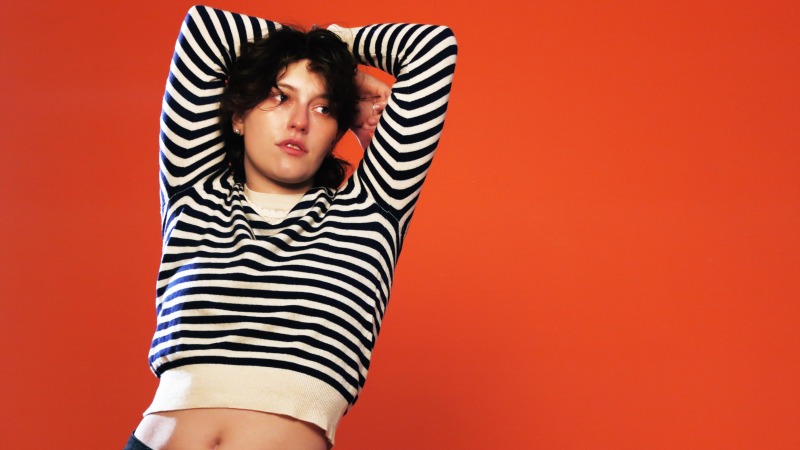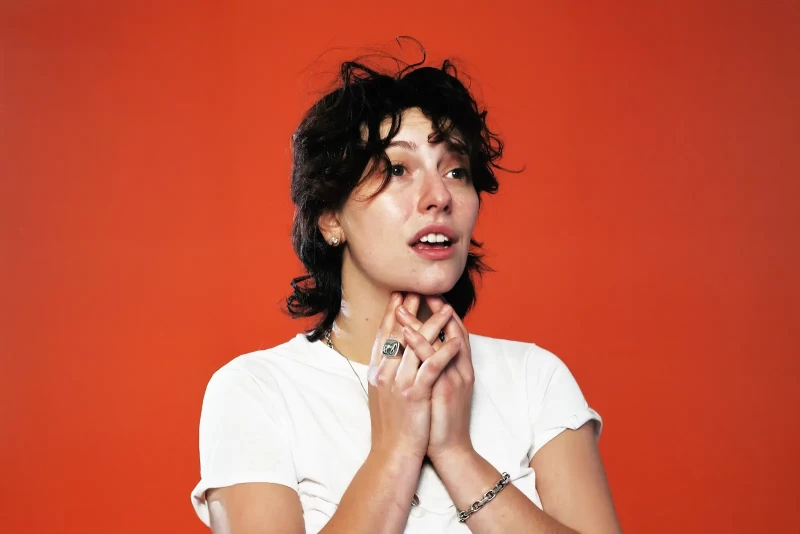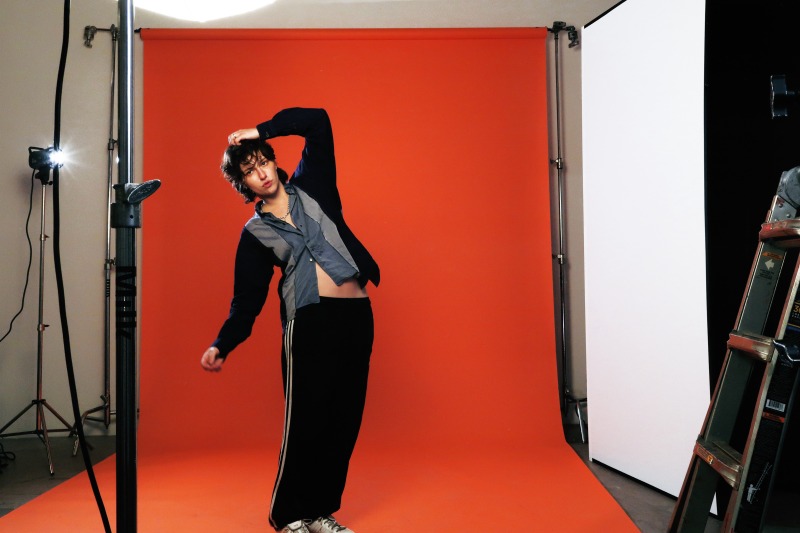COVER STORY | King Princess: Part-Time Woman, Full-Time Icon
After a breakup, Mikaela Straus fled Los Angeles and wrote Girl Violence, an album that, despite the suggestive bedlam of its title, is ecstatic with queer happy endings and a humorous, self-aware cycle of lesbian drama.
Photos by Conor Cunningham
At Go Get Em Tiger in Los Feliz, there are three people turned away from me, each with a shag haircut not unlike Mikaela Straus’. What I learn quickly, as each of them slowly reveal their faces, is that none of them are Mikaela Straus. Eventually the real Straus shows up to the coffee shop’s impromptu femme convention, with a camo short-brimmed hat concealing her ‘do. “I literally go out in Brooklyn and people do me better than I do me,” she tells me, as we watch the lookalikes occasionally exit onto Hollywood Boulevard. “I made a PSA. I was like, ‘Please stop getting my fucking haircut. It’s leaving me no place to go but bald. I’m gonna have to wax my head.’” I mention to Straus that, after Hold On Baby came out in 2022, a dear friend of mine chopped her hair into one of the most immaculate shags I’d ever seen.
“This stealing of the haircut, I’m flattered. But it has to stop. You have to pick a different haircut,” she replies. “I look at people’s haircuts and go, ‘That’s a better version of the haircut I have,’ which is a mindfuck for me! Do I do long? Wig? Crimped? I get told I look like King Princess a lot. That’s a big thing for me. I’m gonna make sure to say to these people, ‘You look like King Princess,’ because I think it’s kind of brilliant. The next step would be, ‘Oh, my God, you’re King Princess!’ But I’m not there yet. It’s not helping that everyone does look like King Princess.”
Straus is briefly back in Los Angeles, the city she lived in for seven years before retreating to Brooklyn in 2023, after the collapse of a near-half-decade relationship. Before moving home, she wrote “Cry Cry Cry,” an immediate step-up from anything else in her repertoire. But doubts from her label, Mark Ronson’s Columbia imprint, Zelig, kneecapped the beginnings of her third album, so she requested a release from her record deal. And even though her feelings about LA haven’t changed, because she likes being a tourist instead of a citizen, a lot of Girl Violence (out September 12) contends with her leaving California for the East Coast. “Cities hold trauma like a body,” she reckons. “The act of writing about it is a release, and I’ve done a lot of that work. Now I get to see my friends, go to nice restaurants, and hang by the pool. Then I get to say deuces and go back to my house.”
The 26-year-old began flirting with stardom in 2018, when “1950,” a gay-as-hell pop paean she wrote in her dorm room during her first semester at USC’s Thornton School of Music, made her a Platinum-certified teenager performing on Saturday Night Live and catching the eyes of millions (now more than half-a-billion), including Harry Styles. Suddenly, Straus was propelled into music’s lesbian mecca and viewed as somebody whose music could be a cord connecting queer generations. When it was time to make her debut record, Cheap Queen, she was held to an expectation of making queer pop songs. “It was a huge lesson for me,” she remembers. “Getting that much instant validation off of something is the easiest way to descend into chaos. I wasn’t prepared. I was a mess. I was resentful of the success. Looking back, it was me being scared and insecure.” Making Cheap Queen, she went on a tear. “I was like, ‘I’m gonna make this record exactly how the fuck I want to make it.” But after folks in her camp pressured her to do the opposite, Straus internalized the pushback, and it stayed with her for years, leaving her disappointed with Cheap Queen, a “failure” she’s only recently reassessed. “I’m like, ‘What a fantastic record. I’m so happy I made that at 19 with my friends. Like, God, I feel so lucky to have done that.”
Straus also felt exhausted with the press’ handling of her identity. “I was confused by the questions that were coming my way, like, ‘What is it like to make gay music?’ I was like, ‘I don’t know anything else. What is it like to be a straight journalist?’” Her songs, even the ones she wrote in grade school, were about being gay. “There was no other option,” she says. “What am I gonna do, make a song about dong? Doesn’t make any sense.” But she did sample a song about dong—reappropriating Nas and Bravehearts’ “Oochie Wally” in “Pussy Is God.” “I thought that was pretty sneaky,” she snickers. “Has ‘Oochie Wally’ ever been used in a lesbian anthem? People don’t talk about that enough.” That idea came from Ronson while he and Straus were in Paris.
Straus’ second King Princess album, Hold On Baby, was not a needle-moving release three years ago—at least not in the way that Cheap Queen was in 2019. But her sophomore effort wasn’t a slump. Critics fucked with it in the places that consumers didn’t, as Straus projected a type of confidence onto those songs, silky jolts of electropop, soul, and bedroom pop that plucked her out of T. Rex territory and dropped her somewhere in-between the Lorde and Charli. But it just didn’t sell. Suddenly, Straus pauses, crosses her legs, and hunches into the microphone. “But I was so fucking miserable when I made Hold On Baby. I was a shell of a person. My grandparents were dying, I was living miserably in LA. I hit a fever pitch. That record feels like a cry for help. I listen back to it and I’m like, ‘God, that’s so fucking sad,’ which is cool. It’s a reminder that I do write autobiographically, and the place I’m in in my life really does dictate what the music sounds like. It’s not cut-and-paste.”

AFTER LEAVING COLUMBIA in 2023, Straus signed with section1, an imprint of the Brooklyn-based Partisan Records, the following year. It’s rare, especially in a musical economy like this, where gaming streams and spamming content have become these seemingly irreversible institutions, for a major-label artist to willingly go indie. But major labels, Straus argues, do not have gatekeeping power like they used to. “There used to be radio, there used to be strings that were pulled by executives,” she explains. “They don’t have that anymore. It’s all about fan engagement, TikTok—what the kids want. There is no deciphering hits anymore.” I try to glean insight on what’s getting lost in conversations around Girl Violence and her decision to sign with section1. She brings up how there’s a universe where 50/50 royalty splits are real, where healthy budgets are possible. “The narrative for a very long time,” she gestures, “was that the meter of success was being signed to a major. It’s not the case anymore. Just because that deal looks shiny doesn’t mean you’re gonna get any perks or benefits from it. Don’t be afraid of the indie game. I was afraid of the indie game. I was told that the indies had no money, that it was very DIY. I’ve never had so many people working on my team.”
That team that she assembled, a crew of “girl bosses,” has shrouded Straus in love, which has been especially cathartic, considering how “me and honest” Girl Violence is. “I love making it, but putting it out is not my jam. I hate it,” she declares. “But to be loved on for being honest, it’s a dream. If you’re someone who is thinking about signing to a major label, or maybe you’ve accrued some success on the internet and you’re getting approached, you don’t have to sign to a major label. It doesn’t matter anymore. You can sign to an indie and you will be just as successful. The only thing that matters is finding people who fucking respect you.”
“Okay,” I say. “It’s 2018 and you’re making Cheap Queen with the team and budget you have now. What does that album look like?”
“It’d be exactly the same,” she reveals. “I bulldozed my way through making that record. I listened to not a single soul, which probably wasn’t the right move. But it was important that I made the exact first record I wanted to make. I fucking fought to do that, and it wasn’t received very well—my aggression and my steadfast want to do exactly what I want to do. But it would probably be the exact fucking thing.”
-

-

-

-

-

-

-

-

-

-

-

-

-

-

-

-

-

-

-

-

-

-

-

-

-

-

-

-

-

-

-

-

-

-

-

-

-

-

-

-









































